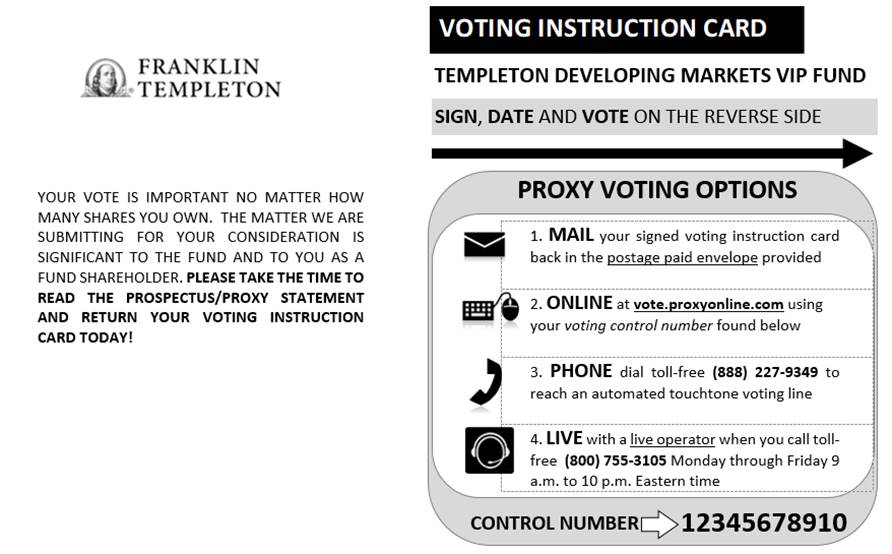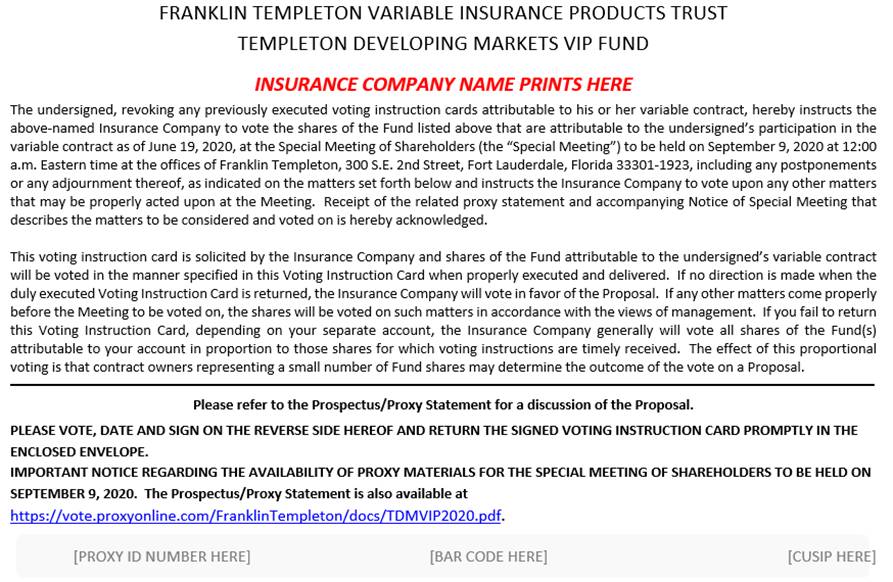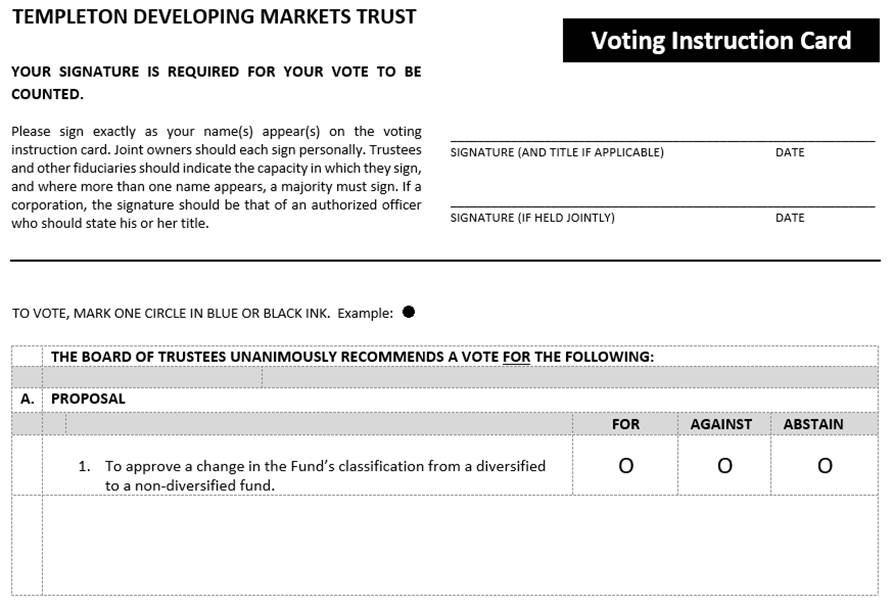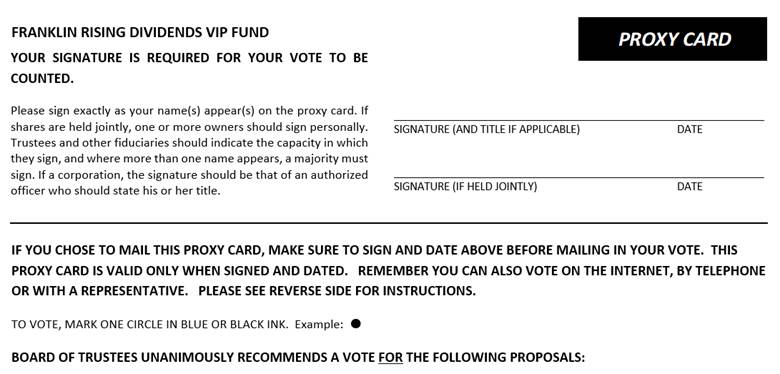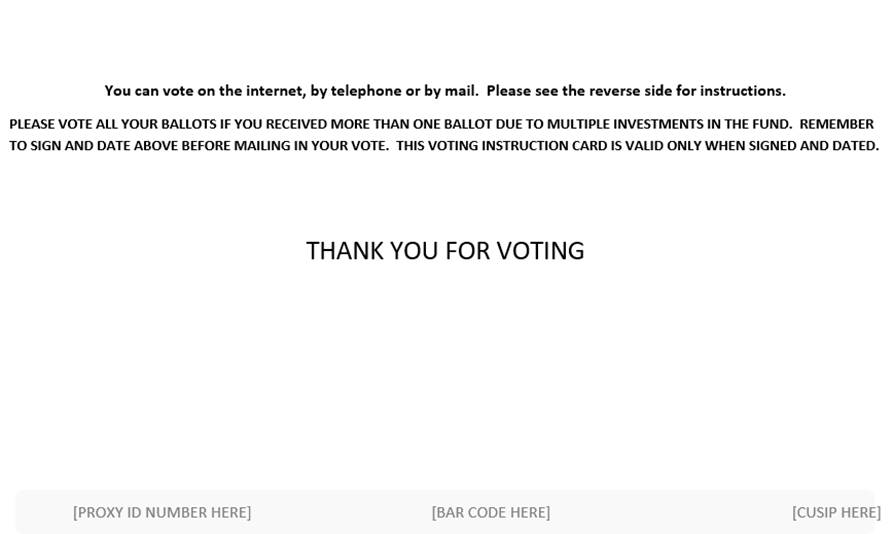Schedule 14A Information
Proxy Statement Pursuant to Section 14(A) of the Securities Exchange Act of 1934
(Amendment No. __)
Filed by the Registrant [X]
Filed by a Party other than the Registrant [ ]
Check the appropriate box:
[x] Preliminary Proxy Statement [ ] Confidential, for Use of the Commission
[ ] Definitive Proxy Statement Only (as permitted by Rule 14a-6(e)(2))
[ ] Definitive Additional Materials
[ ] Soliciting Material under Section 240.14a-12
FRANKLIN TEMPLETON VARIABLE INSURANCE PRODUCTS TRUST
Name of Person(s) Filing Proxy Statement, other than the Registrant)
Payment of Filing Fee (Check the appropriate box):
[X] No fee required.
[ ] Fee computed on table below per Exchange Act Rules 14a-6(i)(1) and 0-11.
(1) Title of each class of securities to which transaction applies:
(2) Aggregate number of securities to which transaction applies:
(3) Per unit price or other underlying value of transaction computed pursuant to Exchange Act Rule 0-11 (set forth the amount on which the filing fee is calculated and state how it was determined):
(4) Proposed maximum aggregate value of transaction:
(5) Total fee paid:
[ ] Fee paid previously with preliminary materials.
[ ] Check box if any part of the fee is offset as provided by Exchange Act Rule 0-11(a)(2) and identify the filing for which the offsetting fee was paid previously. Identify the previous filing by registration statement number, or the Form or Schedule and the date of its filing.
(1) Amount Previously Paid:
(2) Form, Schedule or Registration Statement No.:
(3) Filing Party:
(4) Date Filed:
TEMPLETON DEVELOPING MARKETSFranklin Rising Dividends VIP Fund
(a series of Franklin Templeton Variable Insurance Products Trust)
IMPORTANT SHAREHOLDER INFORMATION
These materials are for a Special Meeting of Shareholders (the “Meeting”) of the Templeton Developing MarketsFranklin Rising Dividends VIP Fund (the “Fund”), a series of Franklin Templeton Variable Insurance Products Trust (the “Trust”), scheduled for SeptemberMarch 9, 2020,2023, at 12:11:00 p.m.a.m., EasternPacific time, that will be held at the offices of Franklin Templeton, 300 S.E. 2nd Street, Fort Lauderdale, Florida 33301-1923.One Franklin Parkway, San Mateo, California 94403-1906. The enclosed materials discuss an important proposalproposals (the “Proposal”“Proposals”) to be voted on at the meeting and contain the Notice of Special Meeting of Shareholders, proxy statement and proxy card and/or voting instruction form. The shares of the Fund are sold to (i) separate accounts of certain life insurance companies (the “Participating Insurance Companies”) to fund benefits payable under certain variable annuity contracts and variable life insurance policies (“Variable Contracts”) issued by the Participating Insurance Companies; and (ii) certain qualified plans. The Participating Insurance Companies hereby solicit and agree to vote at the meeting,Meeting, to the extent required, the shares of the Fund that are held in separate accounts in accordance with timely instructions received from owners of the Variable Contracts. With respect to all other shareholders, the Board of Trustees of the Trust is soliciting your vote.
If you are a Variable Contract owner, a voting instruction form is enclosed. When you vote your voting instruction form, it tells the Participating Insurance Company how you wish to vote the Fund shares attributable to your Variable Contract on important issues relating to the Fund underlying your Variable Contract. If you are a shareholder, a proxy card is enclosed. The enclosed materials contain information about the ProposalProposals being presented for your consideration. We request your prompt attention and vote by mail using the enclosed voting instruction form or proxy card.
We urge you to spend a few minutes reviewing the ProposalProposals in the proxy statement. Then, please fill out and sign the proxy card or voting instruction form/proxy cardform and return it in the postage-paid envelope.envelope, so that it is received prior to the Meeting on March 9, 2023 for your vote to be counted. When Variable Contracts owners return their voting instructions promptly, the Fund may be able to save money by not having to conduct additional solicitations, including having the Participating Insurance Companies forward additional mailings. PLEASE COMPLETE, SIGN AND RETURN eachthe proxy card/card or voting instruction form you receive.
In light of the COVID-19 pandemic, we are urging all shareholders to take advantage of voting by mail[, by telephone or through the Internet (separate instructions are listed on the enclosed proxy card or voting instruction form to vote by telephone or through the Internet)]. Additionally, while we anticipate that the Meeting will occur as-planned on March 9, 2023, there is a possibility that, due to the COVID-19 pandemic, the Meeting may be postponed or the location or approach may need to be changed, including the possibility of holding a virtual meeting for the health and safety of all Meeting participants. Should this occur, we will notify you by issuing a press release and filing an announcement with the Securities and Exchange Commission as definitive additional solicitation material. If you plan to attend the Meeting in person, please note that we will be holding the Meeting in accordance with any recommended and required social distancing and safety guidelines, as applicable.
We welcome your comments. If you have any questions or would likewish to quicklyobtain directions to be able to attend the Meeting and vote your shares,in person, please call AST[AST Fund Solutions, LLC,LLC], our proxy solicitor, toll free at (800) 755-3105. Agents[(800) 755-3105]. [Agents are available 9:00 a.m. – 10:00 p.m., Eastern time, Monday through Friday.Friday].
TELEPHONE AND INTERNET VOTING
[For your convenience, you may be able to vote by telephone or through the Internet, 24 hours a day.day].
[Separate instructions are listed on the enclosed proxy card or voting instruction form or proxy card.form.]
TEMPLETON DEVELOPING MARKETSFranklin Rising Dividends VIP Fund
(a series of Franklin Templeton Variable Insurance Products Trust)
NOTICE OF SPECIAL MEETING OF SHAREHOLDERS
The Board of Trustees of Franklin Templeton Variable Insurance Products Trust, on behalf of the Templeton Developing MarketsFranklin Rising Dividends VIP Fund (the “Fund”), has called a Special Meeting of Shareholders (the “Meeting”) of the Fund whichthat will be held on March 9, 2023, at 11:00 a.m., Pacific time, at the offices of Franklin Templeton, 300 S.E. 2nd Street, Fort Lauderdale, Florida 33301-1923, on September 9, 2020, at 12:00 p.m., Eastern time.One Franklin Parkway, San Mateo, California 94403-1906.
During the Meeting, shareholders of the Fund will be asked to vote on the following proposal:Proposals:
1.Toapprove a change in eliminate the criterion related to the pricing of rising dividends companies that is used to identify “rising dividends” companies for purposes of the Fund’s classification from a diversifiedfundamental investment policy to a non-diversified fund.invest at least 65% of its net assets in securities of certain companies (the “65% Policy”);
2.To modify the criteria related to reinvestment of earnings by, and levels of debt of, rising dividend companies for purposes of the 65% Policy to exclude utility companies from the application of such criteria; and
3.To reclassify the 65% Policy as non-fundamental.
The shares of the Fund are sold to (i) separate accounts of certain insurance companies (the “Participating Insurance Companies”) to fund benefits payable under certain variable annuity contracts and variable life insurance policies (“Variable Contracts”)issued by the Participating Insurance Companies; and (ii) certain qualified plans. The Participating Insurance Companies, as the shareholders of record of the Fund, hereby solicit and agree to vote at the Meeting, to the extent required, the shares of the Fund that are held in separate accounts in accordance with timely instructions received from owners of the Variable Contracts.
By Order of the Board of Trustees,
Lori A. Weber
Co-Secretary and Vice President
July 20, 2020
January 18, 2023
Please sign and promptly return the proxy statement or voting instruction form in the enclosed self-addressed envelope regardless of the number of shares attributable to your Variable Contract.Contract, so it is received prior to the Meeting on March 9, 2023 for your vote to be counted.
IMPORTANT NOTICE REGARDING THE AVAILABILITY OF PROXY MATERIALS FOR THE SPECIAL SHAREHOLDER MEETING TO BE HELD ON SEPETEMBERMARCH 9, 2023, 2020
The Notice of Special Meeting of Shareholders, proxy statement and form of proxy card are available on the Internet at https://vote.proxyonline.com/FranklinTempleton/docs/TDMVIP2020.pdf. The[_______________]. [The form of proxy card on the Internet site cannot be used to cast your vote.]
If you have any questions or wish to obtain directions to be able to attend the Meeting and vote in person, please call AST[AST Fund Solutions, LLC,LLC], our proxy solicitor, toll free at (800) 755-3105.[(800) 755-3105].
INFORMATION ABOUT VOTING
Who is asking for my vote?
The Board of Trustees of Franklin Templeton Variable Insurance Products Trust (the “Trust”), on behalf of the Templeton Developing MarketsFranklin Rising Dividends VIP Fund (the “Fund”), in connection with a Special Meeting of Shareholders of the Fund to be held on SeptemberMarch 9, 20202023 (the “Meeting”), has requested your vote on an important proposal (theproposals (each, a “Proposal” and, together, the “Proposals”).Shares of the Fund are sold to (i) separate accounts of certain insurance companies (the “Participating Insurance Companies”) to fund benefits payable under certain variable annuity or variable life insurance contracts (“Variable Contracts”) issued by the Participating Insurance Company; and (ii) certain qualified plans. As an owner of a Variable Contract, you have the right to instruct the Participating Insurance Company how to vote shares of the Fund attributable to your Variable Contract. Therefore, each Participating Insurance Company hereby solicits voting instructions from the owners of the Variable Contracts issued by such Company with respect to the shares of the Fund attributable to such Variable Contracts.
For the limited purpose of this proxy statement, the terms “shareholder,“shareholder(s),” “you” and “your” refer to Variable Contract owners, as beneficial owners of Fund shares, and to the Participating Insurance Companies as direct owners of Fund shares, as well as any other direct shareholders of the Fund, unless the context otherwise requires.
Who is eligible to vote?
Shareholders of record at the close of business on June 19, 2020January 5, 2023 (the “Record Date”) are entitled to be present and to vote at the Meeting or any adjourned Meeting. Each share of record of the Fund is entitled to one vote (and a proportionate fractional vote for each fractional share) on theeach Proposal at the Meeting. The Notice of Special Meeting of Shareholders, the proxy statement and the proxy card theor voting instruction form and the proxy statement were first mailed to shareholders of record on or about July 20, 2020.January 18, 2023.
On what issues am I being asked to vote?
Shareholders are being asked to vote onapprove the Proposalfollowing changes to the five criteria that are used to identify “rising dividends” companies for purposes of the Fund’s fundamental investment policy to invest at least 65% of its net assets in securities of certain companies (the “65% Policy”):
1.To eliminate the criterion related to the pricing of rising dividends companies for purposes of the Fund’s 65% Policy (the “Pricing Criterion”);
2.To modify the criteria related to reinvestment of earnings by, and levels of debt of, rising dividend companies for purposes of the 65% Policy to exclude utility companies from the application of such criteria; and
3.To reclassify the 65% Policy as non-fundamental.
Why are shareholders being asked to change the 65% Policy and what effect will the changes have on the way the Fund is managed?
The Fund’s classification fromcurrent 65% Policy, which cannot be changed without shareholder approval, is as follows:
Under normal market conditions, the Fund invests at least 65% of its net assets in securities of companies that have:
·consistently increased dividends in at least 8 out of the last 10 years and have not decreased dividends during that time;
·increased dividends substantially (at least 100%) over the last 10 years;
·reinvested earnings, paying out less than 65% of current earnings in dividends;
·either long-term debt that is no more than 50% of total capitalization or senior debt that has been rated investment grade by at least one of the major bond rating organizations; and
·attractive prices, either: (1) in the lower half of the stock's price/earnings ratio range for the past 10 years; or (2) less than price/earnings ratio of the Standard & Poor's® 500 Stock Index.
The Fund’s investment manager, Franklin Advisers, Inc. (“FAV”), believes that, while certain criteria of the 65% Policy still are appropriate for identifying rising dividends companies, other criteria need to be adjusted in light of market conditions to provide the Fund with the most flexibility to invest in attractive rising dividends companies that FAV believes are appropriate investments for the Fund. In light of this, the Board is recommending that shareholders vote to approve: (i) removing the Pricing Criterion (the fifth criterion) above; (ii) changing the third and fourth criterion above to exclude utilities companies; and (iii) reclassifying of the 65% Policy as non-fundamental so that if any of the criteria become too restrictive in the future due to market changes or otherwise, the Board would be able to do so without the time and expense of having to seek shareholder approval, which can be costly to the Fund.
These changes, if approved, are not expected to result in a diversified fundsignificant shift in the Fund’s portfolio or investment strategy. The changes also will align the Fund with FAV’s other rising dividends products, which already have incorporated these changes into their investment strategies.
What will be the effect of reclassifying the 65% Policy as non-fundamental?
The Fund intends to a non-diversified fund. continue to follow the 65% Policy, as amended, even if shareholders approve its reclassification as non-fundamental. However, if in the future, competitive or regulatory changes require that the 65% Policy be modified, the Board would be able to do so without shareholder approval.
How does the Board of Trustees of the Trust recommend that I vote?
The Board of Trustees of the Trust (the “Board”) unanimously recommends that you vote FOR each of the proposal to change the Fund’s diversification classification from a diversified fund to a non-diversified fund.Proposals.
How do I ensure that my vote is accurately recorded?
You may attend the Meeting and vote in person or you may complete and return the enclosed proxy card/card or voting instruction form.
For Variable Contract Owners: Voting instruction forms that are properly signed, dated and received by the applicable Participating Insurance Company will be voted as specified. If you specify a vote on theeach Proposal, your Participating Insurance Company will vote those shares attributable to your Variable Contract as you indicate. Any shares of the Fund for which signed voting instructions forms are received but without specified instructions for a Proposal will be voted FOR that Proposal in accordance with the Proposal.Trustees’ recommendations. Any shares of the Fund for which no voting instructions are received generally will be voted by the Participating Insurance Company in proportion to those shares for which timely instructions are received. The effect of this proportional voting is that Variable Contract owners representing a small number of Fund shares may determine the outcome of the vote on the Proposal.Proposals. Variable Contract owners should contact their Participating Insurance Company for information about any applicable deadline for providing voting instructions to such Participating Insurance Company. Please see your Variable Contract prospectus for information on how to contact your Participating Insurance Company.
For Direct Owners (and not Variable Contract Owners): Proxy cards that are properly signed, dated and received at or prior to the Meeting will be voted as specified. If you specify a vote on thea Proposal, your proxy will be voted as you indicate. If you simply sign, date and return the proxy card, but do not specify a vote on the Proposal,one or more Proposals, your proxy will be voted FOR such Proposals in accordance with the Proposal.Trustees’ recommendations.
May I revoke my proxy?
If you are a Variable Contact owner, you may revoke your voting instructions by sending a written notice to the applicable Participating Insurance Company expressly revoking your instructions, by signing and forwarding to the Participating Insurance Company later-dated voting instructions, or otherwise giving notice of revocation at the Meeting. Variable Contract owners should contact their Participating Insurance Company for further information on how to revoke previously given voting instructions, including any applicable deadlines. Please see your Variable Contract prospectus for information on how to contact your Participating Insurance Company.
If you are a direct owner of Fund shares, you may revoke your proxy at any time before it is voted by forwarding a written revocation or a later-dated proxy card to the Fund that is received by the Fund at or prior to the Meeting, or by attending theMeeting and voting in person. Eligible shareholders who intend to attend the Meeting in person will need to bring proof of share ownership, such as a shareholder statement or letter from a custodian or broker-dealer confirming ownership, as of June 19, 2020,January 5, 2023, and a valid picture identification, such as a driver’s license or passport, for admission at the Meeting. Shareholders without proof of ownership and identification will not be admitted.
Who will pay proxy solicitation costs?
The costs of soliciting proxies, including the fees of a proxy soliciting agent, will be borne bysplit between FAV and the Fund, regardless of whether shareholders approve the Proposal.Proposals. For more information, please see “FURTHER INFORMATION ABOUT VOTING AND THE MEETING – Solicitation of Proxies.”
¿Introduction to the Proposals PROPOSAL: TO CHANGE THE FUND’S classification from a diversified to a non-diversified fund
Background
The Investment Company ActFund’s investment goal is long-term capital appreciation. In order to pursue this goal, under normal market conditions, the Fund invests at least 80% of 1940 (“1940 Act”) requires each investment company to classify itself as either a “diversified” or “non-diversified” fund and reciteits net assets in its registration statement its classification. If a fund is “diversified,” it may not purchase theequity securities of any one issuer if, atfinancially sound companies that have paid consistently rising dividends. Companies that have paid consistently rising dividends include those companies that currently pay dividends on their common stocks and have maintained or increased their dividend rate during the time of purchase, with respect to 75% oflast four consecutive years.
In addition, the fund’s total assets, more than 5% of its total assets would be invested in the securities of that issuer, or the fund would own or hold more than 10% of the outstanding voting securities of that issuer. Up to 25% ofFund’s 65% Policy is a fund’s total assets may be invested without regard to these limitations. These limitations do not apply to securities issued or guaranteed as to principal or interest by the U.S. government or any of its agencies or instrumentalities, or to the securities of other investment companies. A non-diversified fund is any fund that does not meet the diversification requirements of the 1940 Act.
The Fund is currently classified as a “diversified” fund and has the following fundamental investment restriction regarding diversification:
[The Fund may not:] Purchase the securities of any one issuer (other than the U.S. government or any of its agencies or instrumentalities or securities of other investment companies, whether registered or excluded from registrationpolicy to invest, under Section 3(c) of the 1940 Act) if immediately after such investment (a) more than 5% of the valuenormal market conditions, at least 65% of the Fund’s totalnet assets would be invested in such issuer or (b)securities of companies that have:
·consistently increased dividends in at least 8 out of the last 10 years and have not decreased dividends during that time;
·increased dividends substantially (at least 100%) over the last 10 years;
·reinvested earnings, paying out less than 65% of current earnings in dividends;
·either long-term debt that is no more than 10%50% of total capitalization or senior debt that has been rated investment grade by at least one of the outstanding voting securities of such issuer would be owned bymajor bond rating organizations; and
·attractive prices, either: (1) in the Fund, except that up to 25%lower half of the valuestock's price/earnings ratio range for the past 10 years; or (2) less than price/earnings ratio of the Fund’s total assets may be invested without regard to such 5% and 10% limitations.Standard & Poor's® 500 Stock Index.
The Fund’s classification as a “diversified” fund and its current fundamental investment policy on diversification set forth above65% Policy is “fundamental,” meaning it may not be changed or eliminated without shareholder approval.only if shareholders approve such action; however, the 65% Policy is not required by the federal securities laws to be treated as fundamental. The Fund65% Policy has been in effect and has been classified as a “diversified” fund“fundamental” investment policy since itsthe Fund’s inception. However, the asset class in which the Fund invests, the developing markets equity asset class, has experienced fundamental changesFAV believes that, have made it difficult for the Fund to pursue its existing investment strategy while maintaining its diversification status. Over the coursecertain criteria of the last ten years, the developing markets equity asset class has become increasingly dominated by certain large65% Policy still are appropriate for identifying rising dividends companies, as a resultother criteria need to be adjusted in light of new companies being addedmarket conditions to the developing markets investment universe, as well as the significant outperformance of some of these companies, which has resulted in a higher level of concentration of these companies in the Fund’s asset class. In other words, these companies now represent a large percentage of the investment universe in which the Fund invests.
Due to these structural changes to the Fund’s investment universe, the Fund is not able to take as large of positions in these companies that the Investment Manager believes is beneficial for the Fund’s portfolio because it is limited in doing so to maintain its diversified status. (For a diversified fund, all investments greater than 5% in any one issuer may not exceed, in the aggregate, 25% of the fund’s assets.) Thus, changing the Fund’s classification to non-diversified would provide the Fund with the most flexibility to pursueinvest in attractive rising dividends companies that FAV believes are appropriate investments for the Fund. In light of this, Fund’s Board is recommending that shareholders approve the proposed amendments to the 65% Policy and the reclassification of the 65% policy as non-fundamental because the Board and FAV believe the changes would provide FAV with more flexibility to manage the Fund’s assets in a changing investment environment and would enhance FAV’s ability to respond to market, industry or regulatory changes by seeking Board, rather than shareholder, approval when necessary to revise the 65% Policy. In addition, the proposed changes to and reclassification of the 65% Policy would standardize FAV’s rising dividends strategy across all of its accounts, enabling more efficiencies and standardization of investments in the strategy.
The 65% Policy is integral to the management of the Fund and the proposed changes to the 65% Policy are not expected to affect the Fund’s investment strategy givengoal or materially change the manner in which the Fund is currently managed and operated. Although the proposed amendments will give the Fund greater flexibility to respond to possible future investment opportunities by amending parts of the 65% Policy that are outdated, the Board and FAV do not anticipate that the Investment Manager believeschanges, individually or in the highaggregate, will result in a material change in the current level of concentrationinvestment risk associated with an investment in the Fund’s asset class will remain for the foreseeable future. As a non-diversified fund, the Fund could invest a greater portion of its assets in any one issuer and could invest overall in a smaller number of issuers than a diversified fund.at this time.
Therefore,However, should FAV believe that further changes to the 65% Policy are needed or if FAV believes the way the Fund is managed in the future should be modified, FAV will continue to request approval by the Board of the Fund for any such material modifications. In addition, any necessary or appropriate modifications to the risk disclosures to shareholders, are being asked to approve the Proposal to changeincluding amending the Fund’s classification from “diversified” to “non-diversified,” which includes eliminating its current fundamental investment restriction regarding diversification.prospectus and statement of additional information, would be made.
PROPOSAL1:
To eliminate the criterion related to the pricing of rising dividends companies for purposes of the Fund’s 65% Policy
Why are the changes being proposed?
The Pricing Criterion being proposed for removal relates to the pricing of rising dividends companies in relation to their earnings, which has become too restrictive in recent markets. Over the past decade, FAV has seen an increase in valuations, particularly for high quality companies that meet all of the Fund’s investment criteria except for the Pricing Criterion, which has caused the Fund’s investment universe to shrink. FAV believes that, on its own, a company’s price/earnings ratio is an insufficient metric for assessing a company’s value and that price/earnings ratios are not equally meaningful across sectors and at varying points in a market cycle. In addition, Management believes that the impact of market volatility on earnings can skew which companies satisfy the Pricing Criterion.
If the elimination of the Pricing Criterion is approved, the portfolio managers will follow FAV’s investment process for seeking investments that trade below their view of intrinsic value by using FAV’s comprehensive suite of valuation tools. FAV believes that the use of FAV’s intrinsic value investment process will be more effective in identifying rising dividend companies.
What effect will changing the Fund’s status from “diversified” to “non-diversified”removal of the Pricing Criterion have on the Fund?
If approved, the Proposal is approved by shareholders, the Fund would maintain a portfolio that complies with non-diversification status. However, the Fund would limit its investments greater than 5% in any one issuer to no more than 50% of its assets (rather than the 25% limit imposed upon diversified funds) to continue to comply with the tax diversification requirements of Subchapter Melimination of the Internal Revenue Code. The 1940 Act diversification requirements are similarPricing Criterion is not expected to but, are separate and apart from the diversification requirements that the Fund complies with to quality for special tax treatment as set forthresult in Subchapter M of the Internal Revenue Code. The Proposal does nota significant shift in any way affect the Fund’s ability to comply with Subchapter M.portfolio or investment strategy.
Non-diversified funds are more sensitive to economic, business, political or other changes affecting such or similar issuers or securities, which may result in greater fluctuation in the value of the Fund’s shares.
What is the required vote on the Proposal?Proposal 1?
The Proposalelimination of the Pricing Criterion must be approved by the affirmative vote of a “majority of the outstanding voting securities” of the Fund, which is defined in the Investment Company Act of 1940 Act(the “1940 Act”) as the lesser of: (A) 67% or more of the voting securities of the Fund present at the Meeting, if the holders of more than 50% of the outstanding voting securities of the Fund are present or represented by proxy; or (B) more than 50% of the outstanding voting securities of the Fund.
If the Proposal is not approved by shareholders, the Fund’s classification as a diversified fund and its related fundamental investment restriction will remain in effect.Fund (a “1940 Act Majority Vote”).
THE BOARD UNANIMOUSLY RECOMMENDS THAT
SHAREHOLDERS VOTE “FOR” the PROPOSAL.PROPOSAL 1.
PROPOSAL 2:
To MODIFY the criteria related to reinvestment of earnings by, and levels of debt of, rising dividend companies for purposes of the 65% Policy to EXCLUDE utility companies from the application of such criteria
Why are the changes being proposed?
The two criteria being proposed for modification relate to the reinvestment of earnings by, and levels of debt of, rising dividend companies (the third and fourth criteria set forth under the heading “INTRODUCTION TO THE PROPOSALS” above). These criteria are proposed to be modified by including an exclusion for utility companies from the application of the criteria, which would provide the Fund with additional flexibility in applying the criteria. FAV believes that excluding utility companies from the application of these criteria is necessary because utility companies, by nature of their industry, may be regulated and have a capital structure that differs from companies in other sectors. For example, utility companies can sustain higher payout ratios and be considered high quality even if their capital structure has a higher debt level, as they generally have consistent cash flows to service debt, make needed capital investments in their businesses, and support dividend increases.
What effect will the changes have on the Fund?
These changes, if approved, also are not expected to result in a significant shift in the Fund’s portfolio or investment strategy.
What is the required vote on Proposal 2?
The modification of the criteria related to reinvestment of earnings by, and levels of debt of, rising dividend companies for purposes of the 65% Policy to exclude utility companies from the application of such criteria must be approved by a 1940 Act Majority Vote.
THE BOARD UNANIMOUSLY RECOMMENDS THAT
SHAREHOLDERS VOTE “FOR” PROPOSAL 2.
PROPOSAL 3:
To RECLASSIFY the 65% Policy as non-fundamental
Why are the changes being proposed?
FAV believes that reclassifying the 65% Policy as non-fundamental would provide greater flexibility for the portfolio managers and the Fund and would eliminate the need for additional costly meetings of shareholders if changes need to be made to the criteria in response to market developments. In addition, reclassifying the 65% Policy as non-fundamental will allow the Fund to be managed consistently with other FAV investment vehicles following the same investment strategy.
What effect will the reclassification have on the Fund?
The reclassification of the 65% Policy is not expected to have any impact on the way the Fund is managed. Other than the changes described in Proposals 1 and 2, FAV does not intend on making any other changes to the 65% Policy in the near future.
What is the required vote on Proposal 3?
The reclassification of the 65% Policy as non-fundamental must be approved by a 1940 Act Majority Vote.
THE BOARD UNANIMOUSLY RECOMMENDS THAT
SHAREHOLDERS VOTE “FOR” PROPOSAL 3
¿ADDITIONAL INFORMATION ABOUT THE FUND
The Investment Manager. The principal address of Templeton Asset Management Ltd., the Fund’s investment manager,FAV is 7 Temasek Boulevard, Suntec Tower One #38-03, Singapore 038987. The Investment Manager has a branch office in Hong Kong.Franklin Parkway, San Mateo, California 94403-1906. Pursuant to an investment management agreement, the Investment ManagerFAV manages the investment and reinvestment of the Fund’s assets. The Investment ManagerFAV is a wholly owned subsidiary of Franklin Resources, Inc. (“Franklin Resources”).
The Administrator. Pursuant to a subcontract for fund administration services with the Investment Manager, Fund’s investment manager, Franklin Templeton Services, LLC (“FT Services”) provides certain administrative functions for the Fund. FT Services, with its principal address at One Franklin Parkway, San Mateo, California 94403-1906, is an indirect, wholly owned subsidiary of Franklin Resources and an affiliate of the Investment ManagerFAV and the Fund’s principal underwriter. JPMorgan Chase & Co., 270 Park Avenue, New York, NY 10017, has an agreement with FT Services to provide certain sub-administrative services for the Fund.
The Underwriter. The principal underwriter for the Fund is Franklin Templeton Distributors, Inc.LLC (“FT Distributors”), with its principal address at One Franklin Parkway, San Mateo, California 94403-1906. As principal underwriter, FT Distributors receives (i) underwriting commissions in connection with the sale or redemption of Fund shares and (ii) 12b-1 fees pursuant to separate Rule 12b-1 plans adopted by the Board, which fees are used for, among other things, advertising expenses and the costs of printing sales material and prospectuses used to offer shares.
The Transfer Agent. The transfer agent and shareholder servicing agent for the Fund is Franklin Templeton Investor Services, LLC (“FTIS”), located at 3344 Quality Drive, Rancho Cordova, California 95670-7313.
The Custodian. The custodian for the Fund is JPMorgan ChaseThe Bank 270 Park Avenue,of New York Mellon, Mutual Funds Division, 100 Church Street, New York, 10017-2070.NY 10286.
Other Matters.The Fund’s audited financial statements and annual report for its fiscal year ended December 31, 2019,2021, and any subsequent semi-annual report to shareholders, are available free of charge. To obtain a free copy, please contact your financial advisor, the Participating Insurance Company offering your Variable Contract, call (800) DIAL BEN® ((800) 342-5236) or forward a written request to Franklin Templeton Investor Services, LLC, P.O. Box 33030, St. Petersburg, Florida 33733-8030.
Shareholders Sharing the Same Address. If two or more shareholders share the same address, only one copy of this proxy statement is being delivered to that address, unless the Fund has received contrary instructions from one or more of the shareholders at that shared address. Upon written or oral request, the Fund will deliver promptly a separate copy of this proxy statement to a shareholder at a shared address. Please call (800) DIAL BEN® ((800) 342-5236) or forward a written request to Franklin Templeton Investor Services, LLC, P.O. Box 33030, St. Petersburg, Florida 33733-8030, if you would like to (1) receive a separate copy of this proxy statement; (2) receive your annual reports or proxy statements separately in the future; or (3) request delivery of a single copy of annual reports or proxy statements if you are currently receiving multiple copies at a shared address.
Outstanding Shares and Principal Shareholders.The outstanding shares and classes of the Fund as of June 19, 2020 the Record Date were as follows:
Class | Number of Outstanding Shares |
Class 1 Shares | [__]__________] |
Class 2 Shares | [__]__________] |
Class 4 Shares | [__]__________] |
Total Shares | [__]__________] |
The names and addresses of shareholders that owned beneficially 5% or more of the outstanding shares of the Fund are set forth in Exhibit A. From time to time, the number of shares held in “street name” accounts of various securities dealers for the benefit of their clients may exceed 5% of the total shares outstanding of any class of the Fund. To the knowledge of the Fund’s management, as of the Record Date, there were no other entities, except as set forth in Exhibit A, owning beneficially more than 5% of the outstanding shares of any class of the Fund.
[In addition, to the knowledge of the Fund’s management, as of the Record Date, the Trustees and officers of the Trust owned, as a group, less than 1% of the outstanding shares of the Fund and each class thereof.]
Contacting the Board. If a shareholder wishes to send a communication to the Board, such correspondence should be in writing and addressed to the Board at the Fund’s offices as follows: Templeton Developing MarketsFranklin Rising Dividends VIP Fund — One Franklin Parkway, San Mateo, California 94403-1906, Attention: Secretary. The correspondence will be given to the Board for review and consideration.
¿FURTHER INFORMATION ABOUT VOTING AND THE MEETING
Solicitation of Proxies. Your vote is being solicited by the Board. AST[AST Fund Solutions, LLCLLC] (the “Solicitor”) has been engaged to assist in the solicitation of proxies from the Participating Insurance Companies. The cost of soliciting proxies, including the fees of a proxy soliciting agent, isare estimated to be approximately $155,500$[________] and will be borne by the Fund. Any costs borne equally by the Fund will be borne indirectly by Variable Contract owners as beneficial owners of the Fund’s shares and by other shareholders as beneficial owners of the Fund’s shares. FAV.
The Participating Insurance Companies may also engage their own solicitors (which may include the Solicitor) to solicit voting instructions from Variable Contract owners. Such costs, including the fees of a proxy soliciting agent, if any, will be borne by the Participating Insurance Company, although FTIS, or an affiliate, may reimburse certain of their expenses. The Fund expects that the solicitation will be primarily by mail. In addition to solicitation by mail, certain officers and representatives of the Fund or its affiliates and certain financial services firms and their representatives, who will receive no extra compensation from the Fund for their services, may solicit proxies and voting instructions in person or by telephone, electronic means or telegram. However, if theFund believes that additional solicitation is necessary, the Fund may engage certain financial services firms and their representatives, who will be compensated by the Fund for their services, which may include soliciting proxies and voting instructions in person or by telephone, electronic means or telegram. Any such additional solicitation costs would be indirectly borne by shareholders.
As the date of the Meeting approaches, certain Participating Insurance Companies or their Variable Contract owners may receive a telephone call from a representative of the Solicitora solicitor if their votes have not yet been received.
If a shareholder wishes to participate in the Meeting, the shareholder still may still submit the proxy card/card or voting instruction form originally sent with the proxy statement by mail or attend the Meeting in person. If a Variable Contract owner wishes to participate in the Meeting, please contact your Participating Insurance Company for further information regarding how to represent your vote at the Meeting.
Quorum. Quorum. The holders of 40% of the outstanding shares of the Fund entitled to vote, present in person or represented by proxy, constitutes a quorum at the Meeting for purposes of acting upon the Proposal.Proposals. The shares whose proxies reflect an abstention on any item will all be counted as shares present and entitled to vote for purposes of determining whether the required quorum of shares exists.
Method of Tabulation. The vote required to approve theeach Proposal is set forth in the discussion of the ProposalProposals above.
An “abstention” occurs when a shareholder has affirmatively designated to abstain from voting on a Proposal. Generally, abstentions will be treated as votes present at the Meeting, but will not be treated as votes cast. Therefore, abstentions will have the same effect ofas a vote “against” thea Proposal. “Broker non-votes” are proxies from brokers or nominees indicating that such persons have not received voting instructions from the beneficial owner or other person entitled to vote shares on a particular matter with respect to which the brokers or nominees do not have discretionary power. As described above, each Participating Insurance Company, as the shareholder of record of the Fund’s shares, generally is required to vote shares attributable to Variable Contracts as to which no voting instructions are received in proportion (for, against or abstain) to those for which timely instructions are received by the Participating Insurance Company just as any other shares for which the Participating Insurance Company does not receive proper voting instructions. Therefore, the Fund does not anticipate receiving any broker non-votes.
Simultaneous Meetings.Meetings. The Meeting is to be held at the same time as the meetings of shareholders of other U.S. registered investment companies in the Franklin Templeton fund complex. If any shareholder at the Meeting objects to the holding of simultaneous meetings and moves for an adjournment of the Meeting to a time promptly after the simultaneous meetings, the persons designated as proxies will vote in favor of such adjournment.
Adjournment.The Meeting may be adjourned from time to time for any reason whatsoever by vote of the holders of a majority of the shares present (in person or by proxy and entitled to vote at the Meeting), or by the Chairman of the Board or certain officers, whether or not a quorum is present. Such authority to adjourn the Meeting may be used in the event that a quorum is not present at the Meeting, or in the event that a quorum is present but sufficient votes have not been received to approve the ProposalProposals, or for any other reason consistent with applicable state law and the Fund’s By-Laws, including to allow for the further solicitation of proxies and voting instructions. Any adjournment may be made with respect to any business which might have been transacted at the Meeting, and any adjournment will not delay or otherwise affect the effectiveness and validity of any business transacted at the Meeting prior to adjournment. The persons designated as proxies may use their discretionary authority to vote as instructed by management of the Fund on questions of adjournment and on any other proposals raised at the Meeting to the extent permitted by the SEC’s proxy rules of the U.S. Securities and Exchange Commission (“SEC”), including proposals for which management of the Fund did not have timely notice, as set forth in the SEC’s proxy rules.
Shareholder Proposals. The Fund is not required and does not intend to hold regular annual meetings of shareholders. A shareholder who wishes to submit a proposal for consideration for inclusion in the Fund’s proxy statement for the next meeting of shareholders should send his or her written proposal to the Fund’s offices: Templeton Developing Markets VIP Fund — One Franklin Parkway, San Mateo, California 94403-1906, Attention: Secretary, so that it is received within a reasonable time before the Fund begins to print and send its proxy materials for such meeting. A shareholder proposal may be presented at a meeting of shareholders only if such proposal concerns a matter that may be properly brought before the meeting under applicable federal securities laws, state law and the Fund’s governing instruments.
Submission of a proposal by a shareholder does not guarantee that the proposal will be included in the Fund’s proxy statement or presented at the meeting.
No business other than the matter described above is expected to come before the Meeting, but should any other matter requiring a vote of shareholders properly come before the Meeting, including any questions as to an adjournment or postponement of the Meeting, the persons designated as proxies named on the enclosed proxy card will vote on such matters in accordance with the views of management.
management, to the extent permitted under applicable federal securities laws, state law and the Fund’s governing instruments, including proposals for which management of the Fund did not have timely notice, as set forth in the SEC’s proxy rules.
By Order of the Board of Trustees,
Lori A. Weber
Co-Secretary and Vice President
July 20, 2020
January 18, 2023
ExhibitEXHIBIT A –
pRINCIPAL hOLDERS OF fUND sHARES
PRINCIPAL HOLDERS OF FUND SHARES AS OF JUNE 19JANUARY 5, 2023, 2020**
As of June 19, 2020,January 5, 2023, the following shareholders owned beneficially 5% or more of the outstanding shares of the Fund. For purposes of the 1940 Act, any person who owns, directly or through one or more controlled companies, more than 25% of the voting securities of a company is presumed to “control” such company. Accordingly, to the extent that a shareholder identified in the following table as the beneficial owner and holder of record of more than 25% of the outstanding voting securities of the Fund and has voting and/or investment power, the shareholder may be presumed to control the Fund.
Class | Name and Address of Account | Share Amount | Percentage of Class (%) |
Class 1 Shares | | | |
Class 2 Shares
| | | |
| | | |
Class 2 Shares | | | |
| | | |
| | | |
Class 4 Shares | | | |
| | | |
| | | |
* For the benefit of its customer(s).
** In addition, to the knowledge of the Fund’s management, as of the Record Date, the Trustees and officers of the Trust owned, as a group, less than 1% of the outstanding shares of the Fund and each class thereof.






